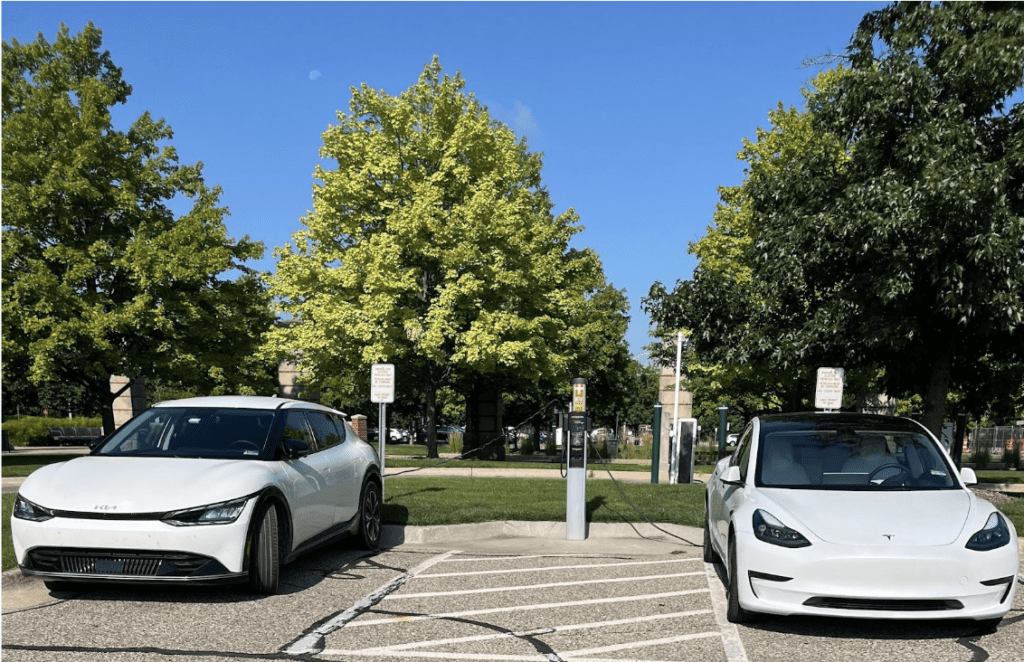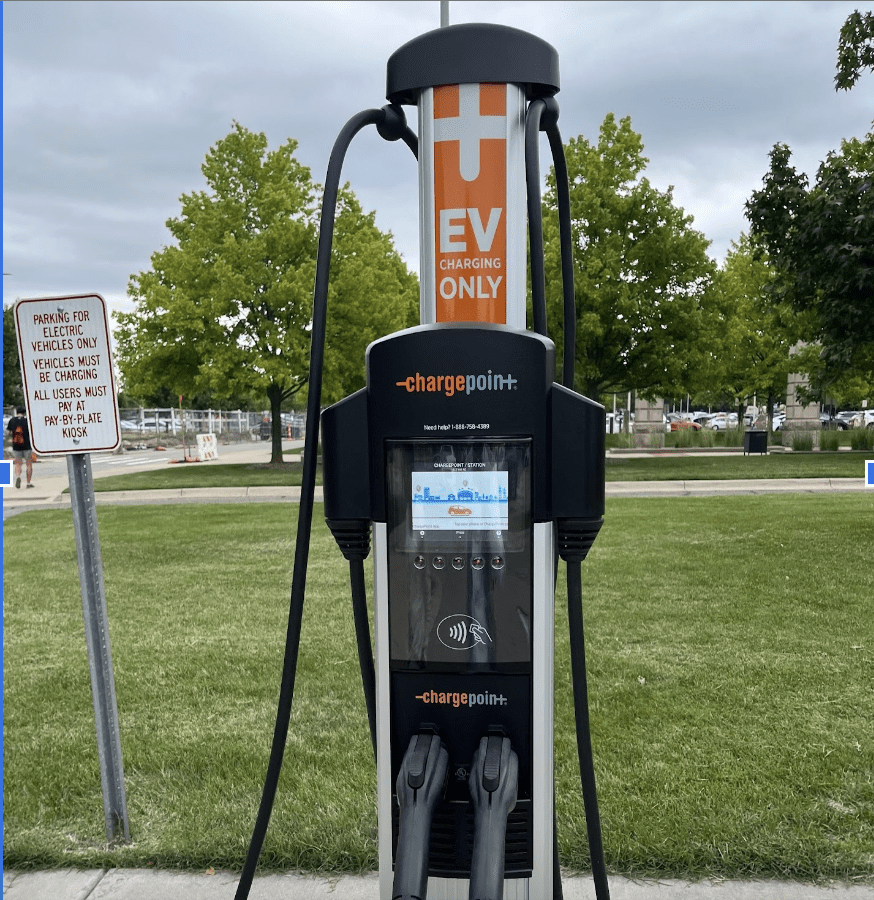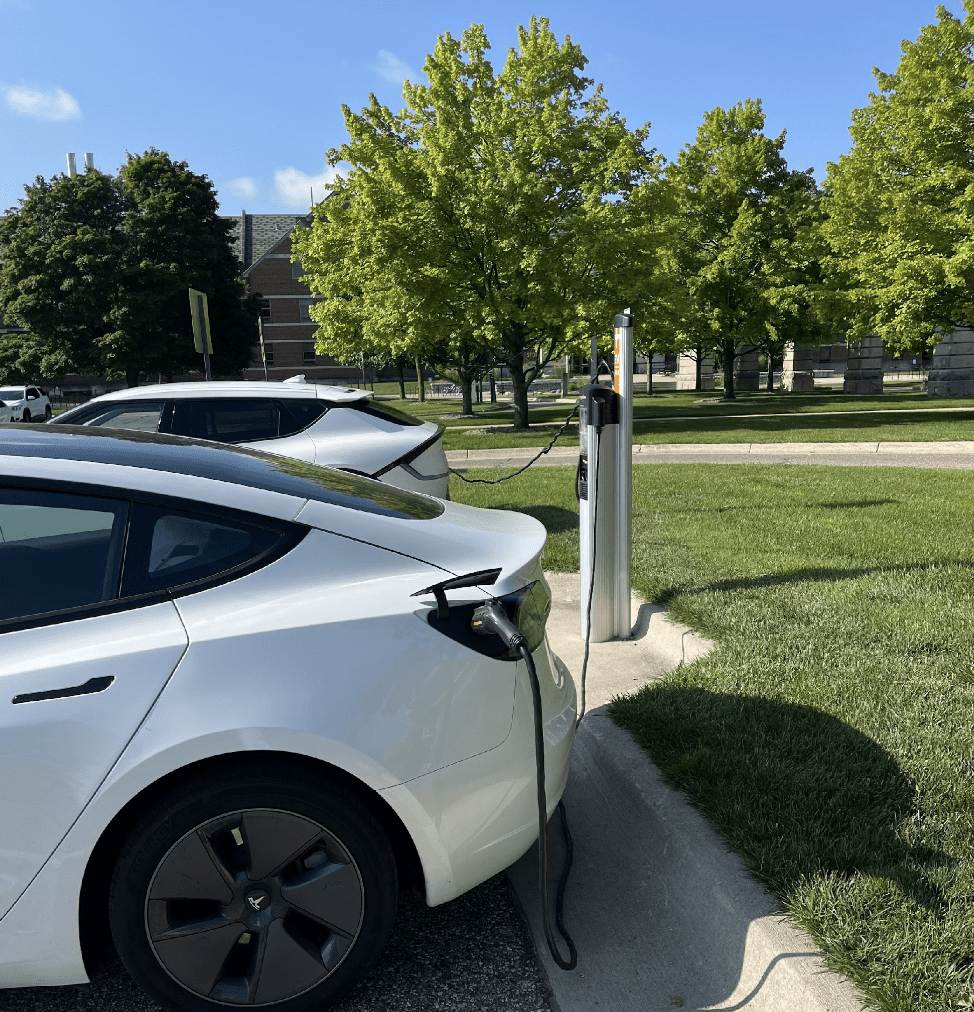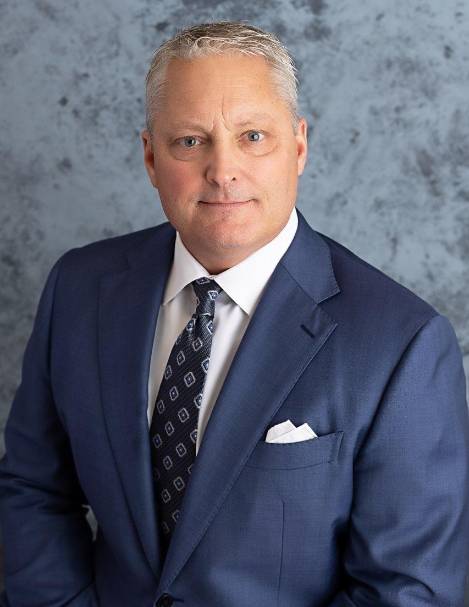Electric vehicles recharging at the parking grounds near the International Center at Michigan State University in East Lansing.
Photo by Murtala Abdullahi
By Murtala Abdullahi
TNCPNEWS
EAST LANSING, MI –Electric vehicles (EVs) are becoming increasingly popular on the Michigan State University (MSU) campus. This is happening with various efforts to enhance efficiencies across the EV technology ecosystem. This trend would help MSU achieve its goal of reducing greenhouse gas emissions by 2030 and reaching climate neutrality by 2050.
James Magee, a faculty member at the International Studies and Programs (ISP), says the university’s focus on environmental sustainability and STEM encouraged using EVs on campus. He notes that economic incentives also played a role in influencing ownership.
For a number of years, Magee and his wife wanted to buy a battery-powered vehicle. The couple decided that would happen the next time they needed to purchase a new one. The opportunity to make the switch came knocking in May after an accident totaled their vehicle.

Magee now operates a mid-size sedan, the Tesla Model 3, known for its impressive range, advanced tech, and speedy acceleration. The vehicle’s onboard sensors and display improve situational awareness and the driver’s experience. However, Magee points out that adjusting and getting used to the systems takes some time.
The transition to EVs benefits drivers by eliminating their reliance on gas and the need for motor oil, which conventional engines use for lubrication. This brings convenience and less pressure on drivers’ wallets, especially with the surge in gas prices and inflation gripping the U.S.
“It really changes your approach to things when you don’t have to stop and get gas,” said Magee. He explains it is a significant consideration when you have to budget two to four hundred dollars every month just to pay for fuel needed to move around.
The availability of charging infrastructure on the MSU campus has made owning EVs convenient. They can be utilized for free and only start charging if a vehicle is parked in the space fully charged. He explained, “If you take a spot with a fully charged vehicle they start charging you ten dollars an hour to make you move your car.”
“It’s nice to know that if I am low on charge and coming to work I can usually find a spot to plug my car in and it should be fully charged by the time my work day is done.” This, he described as a huge cost saver.
However, as EVs are becoming more popular, there is increasing demand for more charging installations on campus. It is becoming harder for Magee to find an empty charging station unless he arrives early.
The hybrid experience
The incentive to transition from an internal combustion engine also extends to hybrid vehicles. During purchase, the federal government gives a $7,500 tax credit, says Hasan Metin Aktulga, an Assistant Professor at the Department of Computer Science and Engineering.
Unlike the EVs, the hybrid is powered by both gas and battery providing flexibility for the user. Aktulga describes the experience as having essentially the best of both worlds. “I get about 30 miles on battery which is sufficient for in-city driving and charge it overnight. Intercity, I don’t have to worry about charging, no range anxiety.”
His vehicle maintenance is cheaper because the combustion engine is not used frequently. Similarly, the brakes do not need to be replaced due to its generative braking system. However, he needs to change the engine oil every 10 thousand miles.

Electric vehicle charging station at Michigan State University in East Lansing.
Photo Murtala Abdullahi
Aktulga has also observed the challenges with getting free space to charge, saying that “they used to be quite available, but with the increase in EVs, it is now more challenging to find available stations.
Another problem is the battery pack’s limited lifespan, which is a relatable concern for both hybrid and EV users. The batteries are usually one of the most expensive components in the vehicle, as such replacing them can be a pricey endeavor.
For Aktulga, the complexity of operating combustion and electric systems in one vehicle comes with the risk of breakdowns. Even though he has not encountered any significant issues so far, it’s still a concern, stating that “there’s no guarantee.”
MSU’s embrace of EV technology and products
Judd Herzer, MSU’s Mobility Director, says the embracing of greener transport systems is part of its climate and carbon reduction plans ,as well as, its student success plan. He describes it as a way of creating a high quality of living for the people on campus. It also operates 14 public charging stations. Last year, 2 new fast-charging EV stations expected to cost $4 per hour were launched near MSU’s campus for public use.
The university is also monitoring the trajectory of EVs on campus to anticipate needs and roll out more charging stations if needed. At the same time, they are ensuring it can keep up with rapid technological advancements. Herzer compared the evolution to improvements that have occurred over the years with mobile phones.
An exciting project at MSU is using an electric autonomous transit bus. The green and smart mobility system can navigate through its route and return to its home base where a human operator will plug it in for charging. However, there is future potential to utilize wireless charging technology.
The interest of the EV industry at MSU revolves more than just infrastructure deployment. Herzer explains that it includes working with older or newer companies to develop better products and efficient manufacturing processes. The university also supports them in reaching more markets faster through studies into their practices and making recommendations on how to change things.
MSU has been involved in producing research to help guide the allocation of resources and installation of facilities. The location for the two new fast chargers installed last year was determined by research done by a team led by Mehrnaz Ghamami, an associate professor of civil and environmental engineering. The team has also developed an EV charging optimization tool called ECHO.
Herzer further explains that the university has produced 8 reports for Michigan and surrounding states on what charging stations are needed and where to put them. The effort facilitates using the funds provided by the National Electric Vehicle Infrastructure (NEVI) Formula Program which aims to make chargers accessible to Americans. The Bipartisan Infrastructure Law signed by President Joe Biden in November 2021 established the program.
For example, it was revealed that Michigan will receive $110 million in NEVI Formula Program funding.
Herzer says, “States want to know where they should be spending those dollars to put charging stations in the ground so that people can use them.”
MSU’s study will assess the number of charging stations and the level of charging capability required to support EVs and their travel across the state.
Another important ecosystem component in which MSU is interested is the cybersecurity realm to safeguard people’s financial payments and data using charging stations. This threat is also a concern for the government, as noted by the Office of Cybersecurity, Energy Security and Emergency Response, which states that the increased use and adoption of EVs comes with increased risks across supply equipment and the charging infrastructure ecosystem.
MSU’s science and engineering teams are also innovating EV solutions to enhance its use. A research team led by Prof. Dr. Wei Liao from the Biosystems Engineering Department focuses on producing renewable energy from dairy farm waste that would be employed to power batteries. In July, the United States Army announced a new $9 million initiative with MSU to make electric autonomous vehicles safer, smarter, and more dependable.
Murtala Abdullahi is a journalist and researcher interested in climate change, peace, and security in Nigeria and the Lake Chad region. He founded the Goro Initiative, a non-profit that promotes environmental peacebuilding, climate security, and resilience. He is currently a climate security associate with the Surge Africa Organisation and volunteers with the World Economic Forum’s Abuja Global Shapers Hub, where he serves as the climate and environment lead.
In 2023, he was honored with the Active Citizen Award by BudgIT, a major civic-tech organization in Nigeria that promotes openness, accountability, and service delivery. Murtala participated in the 2024 Mandela Washington Fellowship for Young African Leaders. He was placed at Michigan State University under the Leadership in Civic Engagement track



